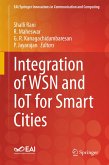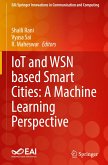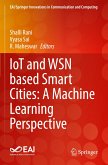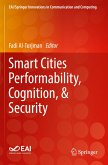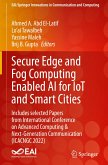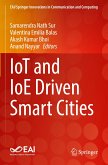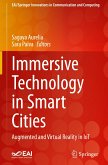Integration of WSN and IoT for Smart Cities
Herausgegeben:Rani, Shalli; Maheswar, R.; Kanagachidambaresan, G. R.; Jayarajan, P.
Integration of WSN and IoT for Smart Cities
Herausgegeben:Rani, Shalli; Maheswar, R.; Kanagachidambaresan, G. R.; Jayarajan, P.
- Broschiertes Buch
- Merkliste
- Auf die Merkliste
- Bewerten Bewerten
- Teilen
- Produkt teilen
- Produkterinnerung
- Produkterinnerung
This book exploits the benefits of integration of wireless sensor networks (WSN) and Internet of Things (IoT) for smart cities. The authors discuss WSN and IoT in tackling complex computing tasks and challenges in the fields of disaster relief, security, and weather forecasting (among many others). This book highlights the challenges in the field of quality of service metrics (QoS) in the WSN based IoT applications. Topics include IoT Applications for eHealth, smart environments, intelligent transportation systems, delay tolerant models for IoT applications, protocols and architectures for…mehr
Andere Kunden interessierten sich auch für
![Integration of WSN and IoT for Smart Cities Integration of WSN and IoT for Smart Cities]() Integration of WSN and IoT for Smart Cities77,99 €
Integration of WSN and IoT for Smart Cities77,99 €![IoT and WSN based Smart Cities: A Machine Learning Perspective IoT and WSN based Smart Cities: A Machine Learning Perspective]() IoT and WSN based Smart Cities: A Machine Learning Perspective116,99 €
IoT and WSN based Smart Cities: A Machine Learning Perspective116,99 €![IoT and WSN based Smart Cities: A Machine Learning Perspective IoT and WSN based Smart Cities: A Machine Learning Perspective]() IoT and WSN based Smart Cities: A Machine Learning Perspective116,99 €
IoT and WSN based Smart Cities: A Machine Learning Perspective116,99 €![Smart Cities Performability, Cognition, & Security Smart Cities Performability, Cognition, & Security]() Smart Cities Performability, Cognition, & Security62,99 €
Smart Cities Performability, Cognition, & Security62,99 €![Secure Edge and Fog Computing Enabled AI for IoT and Smart Cities Secure Edge and Fog Computing Enabled AI for IoT and Smart Cities]() Secure Edge and Fog Computing Enabled AI for IoT and Smart Cities116,99 €
Secure Edge and Fog Computing Enabled AI for IoT and Smart Cities116,99 €![IoT and IoE Driven Smart Cities IoT and IoE Driven Smart Cities]() IoT and IoE Driven Smart Cities131,99 €
IoT and IoE Driven Smart Cities131,99 €![Immersive Technology in Smart Cities Immersive Technology in Smart Cities]() Immersive Technology in Smart Cities89,99 €
Immersive Technology in Smart Cities89,99 €-
-
-
This book exploits the benefits of integration of wireless sensor networks (WSN) and Internet of Things (IoT) for smart cities. The authors discuss WSN and IoT in tackling complex computing tasks and challenges in the fields of disaster relief, security, and weather forecasting (among many others). This book highlights the challenges in the field of quality of service metrics (QoS) in the WSN based IoT applications. Topics include IoT Applications for eHealth, smart environments, intelligent transportation systems, delay tolerant models for IoT applications, protocols and architectures for industrial IoT, energy efficient protocols, and much more. Readers will get to know the solutions of these problems for development of smart city applications with the integration of WSN with IoT.
Produktdetails
- Produktdetails
- EAI/Springer Innovations in Communication and Computing
- Verlag: Springer / Springer International Publishing / Springer, Berlin
- Artikelnr. des Verlages: 978-3-030-38518-7
- 1st edition 2020
- Seitenzahl: 216
- Erscheinungstermin: 19. März 2021
- Englisch
- Abmessung: 235mm x 155mm x 12mm
- Gewicht: 335g
- ISBN-13: 9783030385187
- ISBN-10: 3030385183
- Artikelnr.: 61213152
- Herstellerkennzeichnung Die Herstellerinformationen sind derzeit nicht verfügbar.
- EAI/Springer Innovations in Communication and Computing
- Verlag: Springer / Springer International Publishing / Springer, Berlin
- Artikelnr. des Verlages: 978-3-030-38518-7
- 1st edition 2020
- Seitenzahl: 216
- Erscheinungstermin: 19. März 2021
- Englisch
- Abmessung: 235mm x 155mm x 12mm
- Gewicht: 335g
- ISBN-13: 9783030385187
- ISBN-10: 3030385183
- Artikelnr.: 61213152
- Herstellerkennzeichnung Die Herstellerinformationen sind derzeit nicht verfügbar.
Dr. Shalli Rani is Associate Professor in CSE with Chitkara University, Rajpura, Punjab, India. She has 15 years teaching experience. She received MCA degree from Maharishi Dyanand University, Rohtak in 2004 and the M.Tech. degree in Computer Science from Janardan Rai Nagar Vidyapeeth University, Udaipur in 2007 and Ph.D. degree in Computer Applications from Punjab Technical University, Jalandhar in 2017. Her main area of interest and research is Wireless Sensor Networks, Underwater Sensor networks and Internet of Things. She has published/accepted/presented more than 25 papers in international journals /conferences. She has worked on Big Data, Underwater Acoustic Sensors and IoT to show the importance of WSN in IoT applications. She received a young scientist award in Feb. 2014 from Punjab Science Congress, in the same field. Dr. R. Maheswar has completed his B.E (ECE) from Madras University in the year 1999, M.E (Applied Electronics) from Bharathiyar University inthe year 2002 and Ph.D in the field of Wireless Sensor Network from Anna University in the year 2012. He has about 18 years of teaching experience at various levels and presently working as Dean - Research (Assistant) and Associate Professor in the School of EEE, VIT Bhopal University, Bhopal. He has published 52 papers at International Journals and International Conferences and published patents. His research interest includes Wireless Sensor Network, IoT, Queueing theory and Performance Evaluation. He has been serving as editorial review board member for peer reviewed journals, guest editor for Wireless Networks Journal, Springer and edited books supported by EAI/Springer Innovations in Communications and Computing book series. Dr. G. R. Kanagachidambaresan received his B.E degree in Electrical and Electronics Engineering from Anna University in 2010 and M.E Pervasive Computing Technologies in Anna University in 2012. He has completed his Ph.D. in Anna University Chennai in 2017. He is currently an Associate Professor, Department of CSE, Veltech Rangarajan Dr. Sagunthala R&D Institute of Science and Technology. His main research interest includes Body Sensor Network and Fault tolerant Wireless Sensor Network. He has published several reputed articles and undertaken several consultancy activities for leading MNC companies. He has also guest edited several special issue articles and serving as editorial review board members for peer reviewed journals. Dr. P. Jayarajan has completed his B.E (EEE) from Madurai Kamaraj University in the year 2004, M.E (Applied Electronics) from Anna University in the year 2008 and Ph.D. in the field of Wireless Sensor Network under Anna University in the year 2018. He has about 12 years of teaching experience and presently working as an Assistant Professor in the Electronics and Communication Engineering Department, Sri Krishna College of Technology, Coimbatore. He has published 15 papers at International Journals and Conferences. His research interest includes Wireless Sensor Network and Queueing theory.
Introduction.- Part I: WSN integrated IoT applications.- IoT Applications for eHealth, smart cities.- Hybrid networks for smart environment.- Smart Metering.- Intelligent Transportation Systems.- Vehicular communication networks.- Part II: Wireless Communication protocols for smart environment.- Localization problems.- Protocols for WSN.- Cross layer design issues.- Prototypes for new applications for WSNs and IoT.- Delay tolerant models for IoT applications.- QoS enhancements.- Protocols and architectures for Industrial IoT.- Health care solution and data analytics in hospital environment.- Role of AI and bio inspired computing in decision making.- Deep learning concepts aiding smart city applications.- Part III: Energy optimization and security.- Energy efficient protocols.- Power optimization algorithms.- Challenges in data gathering and processing.- Security, privacy and trust in the IoT context.- Handling network failure during critical duration.- Trust models and digital signature concepts for resource starving embedded systems.- Reliability analysis and fault tolerant architecture for IoT and Edge Computing.- Conclusion.
Introduction.- Part I: WSN integrated IoT applications.- IoT Applications for eHealth, smart cities.- Hybrid networks for smart environment.- Smart Metering.- Intelligent Transportation Systems.- Vehicular communication networks.- Part II: Wireless Communication protocols for smart environment.- Localization problems.- Protocols for WSN.- Cross layer design issues.- Prototypes for new applications for WSNs and IoT.- Delay tolerant models for IoT applications.- QoS enhancements.- Protocols and architectures for Industrial IoT.- Health care solution and data analytics in hospital environment.- Role of AI and bio inspired computing in decision making.- Deep learning concepts aiding smart city applications.- Part III: Energy optimization and security.- Energy efficient protocols.- Power optimization algorithms.- Challenges in data gathering and processing.- Security, privacy and trust in the IoT context.- Handling network failure during critical duration.- Trust models and digital signature concepts for resource starving embedded systems.- Reliability analysis and fault tolerant architecture for IoT and Edge Computing.- Conclusion.

